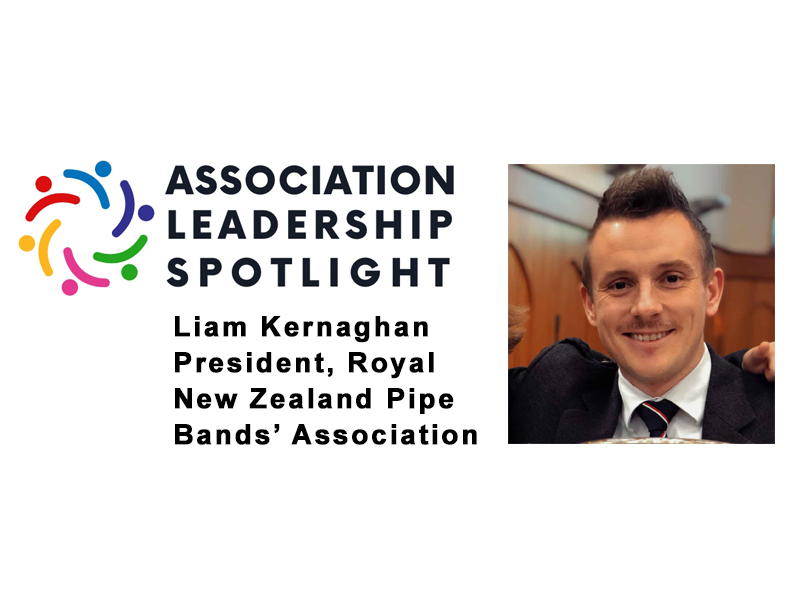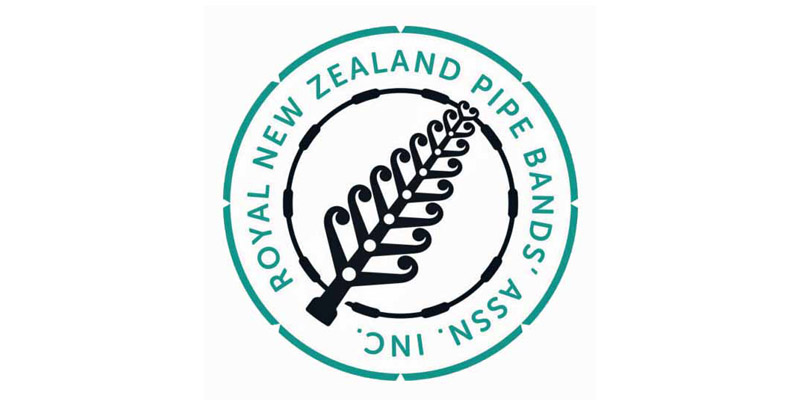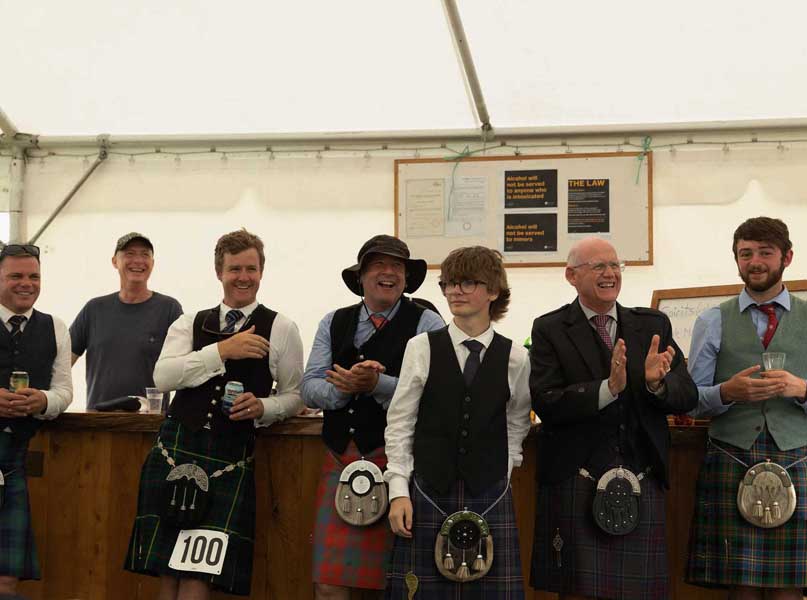Association Leadership Spotlight: Liam Kernaghan, President RNZPBA – Part 2
 We continue our conversation with recently-elected Royal New Zealand Pipe Bands’ Association President Liam Kernaghan, one of the youngest and most accomplished association leaders in history.
We continue our conversation with recently-elected Royal New Zealand Pipe Bands’ Association President Liam Kernaghan, one of the youngest and most accomplished association leaders in history.
In Part 1, Kernaghan discussed the RNZPBA’s legacy and the positive state and trajectory his predecessor, Iain Blakeley, created for the Kiwi scene in Australia.
In Part 2, Kernaghan discusses his organization’s efforts to attract and keep youths involved in piping and drumming. He also discusses the need to reduce the number of established members who drop out of competitive piping and drumming, a problem that every association worldwide has faced but has generally done little to address.
Shortly after the publication of Part 1, the RNZPBA announced an Open Town Hall, inviting members to join the February 2nd meeting prepared with questions, comments, and observations for the association’s new board of directors. The first significant event in Kernaghan’s tenure as president appeared to put his expressed commitment to transparency and service to members into action.
A transcript of our discussion:
Part 2
pipes|drums: In Part 1, we got the gist of how you think. But, what about your leadership philosophy? What’s your view of a good leader, and what comprises a good leader?
Liam Kernaghan: I’m still a player. I love playing. I’m never considering not playing. And from my perspective, I’ve always got sort of a player’s mentality first and foremost. And, no different to Iain [Blakeley] in some respects, but it’s always what’s best for the players and what’s best for the bands that comes first. And everything that we will be trying to do going forward is making sure that whether it’s bands, whether it’s some of our solo drummers, whether it’s the wider piping and drumming community that that the players interests and what’s best for the players, kind of sits first and foremost.
It’s quite hard when you’re really invested in a hobby, as we are in piping or drumming; it becomes your life. It’s the thing that dominates everything that you do. And it’s kind of hard to remember that A, associations are largely volunteer organizations, and B, there are varying degrees of interest. And, there are some non-playing volunteers. There are some playing volunteers. There are parents and supporters that have been involved with it. And for us, and for me, it’s always about ensuring that whether that really keen volunteers who piping and drumming is their life, or whether it’s just their parents who want to kind of lend a hand.
There’s a really clear vision and purpose. Because, we down under, we’ve got many things we’d love to do, and there are many things that that we could do if we had infinite resources, but we’ve got to make sure that we’re guided by that vision and purpose. For me, it’s all about making sure that we get more young people into piping and drumming and making sure that our bands can be successful at home and overseas. that’s broadly, broadly where I’m thinking.
I’m very much a team man. I like having a really solid team around me, and we’re very lucky to have a great board and a lot of group leaders, whether it’s in education or whether it’s in our competitions, or whether it’s in our centers, which are kind of like our branches here in New Zealand. We’ve got great people right across there, and it’s making sure that we’re all really aligned on what our vision and purpose is, but all making sure that they’ve got the support from the association to be able to do their job. Because, as I said, they’re all volunteers. They’re all doing it out of the love of something, and we’ve got to make sure that they feel supported and make sure they’ve got the tools to be able to do the job that they love doing.
p|d: The Royal New Zealand Pipe Bands’ Association is doing many youth-oriented things. Does that leave behind other people at the other end, say, those older than 40? There’s a lot of attrition in pipe band associations. Are you conscious of that as well, and retaining those people who have who might otherwise leave the piping and drumming community?
LK: Yeah, absolutely. And while our focus is certainly on making sure we’ve got that next generation come through, we’re totally aware that the majority of our like individual members and bands right across the country are older, and there are lots of older people who might want to pick the skill up at a later point in life, or might have put it down after some time. It’s a balance. We’re certainly always going to be trying to encourage particularly younger people to come through and hopefully stay on. But certainly, we want to make sure that particularly those sort of Grade 4B, Grade 4, Grade 3 bands who have the majority of our members who are older, have the same support structures and feel like they get value from the Association.
On the attrition point, it’s a worldwide issue. I don’t think any particular jurisdiction is immune from it, or places different challenges., here at home, there are a lot of people who play pipes and drums at school or play it when they are at school. they’re either in a in a school system, or they’re in a local community band or a city band, and then they go away to university, or they get a job, or they travel the world on their own and they stop, or they take a break. And for us, there’s kind of that sweet spot where people either at 18 do it for life and they become lifers, or they sort of take a bit of a break and maybe never come back. One of the challenges we’re looking at trying to address is how we encourage people who have a great upbringing and a great sort of first seven or eight years of learning, kind of keeping them going in the pipe band system.
New Zealand has different challenges, maybe to some other parts in the world when it comes to this, people often come from remote rural communities and go into the big city and they experience new things. And it’s trying to make piping and drumming still interesting and still relevant to them when they’re kind of getting on with their life.
How do we make it easier for them to stay involved? How do we kind of make it that it’s something that doesn’t matter if you end up getting a really busy job, or you have kids or life changes. How can we kind of help you to keep going with it?
Another part of the challenge is people do sort of grow up. And piping and drumming was something they did at school with their mates, and it was a hobby that they enjoyed doing when they had the protection of their parents and kind of family network, but when they kind of get out into the big, wide world and things get a bit tougher, or things kind of change for them, piping and drumming sort of falls off a little bit. How do we make it easier for them to stay involved? How do we make it that it’s something that doesn’t matter if you end up getting a really busy job, or you have kids or life changes. How can we kind of help you to keep going with it? Because for us, it’s, it’s really important that people, well, we want people to stay in, piping and drumming. We think it’s not just about the music, it’s about the the skills, the life skills, that they learn outside of just music, and it’s all the friendships and the communities they’re part of. And attrition certainly is a problem for us here at home, like the rest of the world, but it’s something we are totally cognizant of and really keen to help bands address.
p|d: As possibly the youngest president of a major pipe piping and drumming association, is that a sign of the times? Do you think things will get a bit younger regarding leadership?
LK: I hope so because my background, obviously, my day-to-day career has been in politics. And for me, it’s always been really important that you’ve got a full range of voices at the table.
Certainly, there is a lot to be said for age and experience and wisdom and having seen it all before and done it all before and that’s why I’m very grateful for Iain staying on and making sure I don’t do lots of dumb stuff. But equally, the next generation’s voice is really important, and not just because it’s them at the forefront of competing still, and it’s still very much. They’ve still got a long career to go, but they do, we do.
I’ll include myself in the younger generation. We do think about things differently. And we do have different ways of doing things. So, for instance, while, there’s a lot that will continue on from Iain’s time and Iain’s tenure as president, there are things that are going to be different, for instance, we make it really hard for bands to interact with the association. A lot is still done manually. I want to digitize and make it more efficient and make it easier for bands to be part of it and to get information and to be able to access things which help them out.
For instance, we have a lot of really remote, rural bands who don’t have access to tutors, I want to make it easier for them to have the resources to be able to do it themselves and not feel like they’re left out. So, there are definitely things that we think about differently We are 12,000 miles away, we’re at the we’re at the bottom of the world. Not that we have more license to do things differently, but I would like to be able to think that we could do things differently., I’d like to think about the fact that, well, just because we’ve done something for 40 or 50 years doesn’t mean it’s the right way to do it, or there are more modern alternative ways to do things.
I’m not suggesting we totally change the face and shape of how pipe band competition and pipe band performance changes, but I do think there are ways when it comes to promoting piping and drumming and making piping and drumming and pipe bands more accessible to the general public that we can try and make it a bit more public-friendly, family-friendly, and try to encourage more people to be part of it.
p|d: Getting involved with an association for many is like, “Whoa, not doing that!” Do associations bring that on themselves? Do they push people away? What’s needed to get more younger people involved with their branches or their executive?
LK: As far as bringing younger people into the pipe band association and into the pipe band movement, we’re a smaller community than the rest of the pipe band world There are only five-and-a-half-million people in New Zealand. There is a little bit of a Kiwi mentality that everyone’s got to muck in at some stage. Most people my age who are still competing and still really wanting to kind of progress in the competitive or playing side of their hobby, it’s sort of seen as a bit of a distraction, or it’s seen as something that might take up too much time.
Certainly, one of the things I thought about before I put my hand up was how much is this going to take away from my competitive side? I’m lucky that I’m not currently competing in a pipe band, so, I do have time on my hands, but there’ll be a lot of people around my age who will just see it as a bit of a distraction from the playing side. I totally get that, but in New Zealand, as I said, we’re a smaller community, and there’s always been a bit of a culture of mucking in when it’s when it’s needed. And like the likes of Greg Wilson, Richard Hawk, Brendan, Eade Marion Horsburgh and others, for years, have done that, and now we’re seeing the likes of myself, Stuart Easton, and Willie Rowe, who are mucking in when it’s when it’s their turn. And without doing our turn is the wrong turn of phrase.
I would only encourage more young people to be involved, because it’s what we’re going to be doing for the next 30, 40, 50 years, and hopefully longer. We’ve got the opportunity to shape that, and we’ve got the opportunity to shape the future.
When we feel like it’s our time to give back, we see it being, if we don’t make that contribution, then things won’t happen because people do give a long time to pipe band associations. Most people around the world give decades and decades of time, and it’s certainly incredibly valuable. But people do move on, and they retire, or other things happen. And making sure that you’ve got people coming through – and, back to the start, Iain Blakeley has certainly been encouraging us to ensure we’ve got new people coming through.
We’ve got young people who are part of the Association. It’s not necessarily making sure that you’ve got a role for someone immediately. It’s about what contribution they can make and what skill set they might be able to add to the rest of the association. I would only encourage more young people to be involved because it’s essentially our future. It’s what we’re going to be doing for the next 30, 40, 50 years, and hopefully longer. We’ve got the opportunity to shape that, and we’ve got the opportunity to be a part of that. And it’s not just about the need or the want to give back because of the opportunities you’ve had, but it’s also the opportunity to shape the future. And that’s incredibly important.
p|d: Really well said, and inspirational. Liam, we wish you nothing but success in your newest venture. You’ve always got your hands full with things, but you’re always an interesting conversation with lots of ideas, and may that be an inspiration for other associations and pipers and drummers around the world.
We thank RNZPBA President Liam Kernaghan for taking the time to speak with pipes|drums.
Stay tuned for the next installment in our ongoing Association Leadership Spotlight series.






NO COMMENTS YET